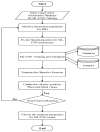Optimization System Based on Convolutional Neural Network and Internet of Medical Things for Early Diagnosis of Lung Cancer
- PMID: 36978711
- PMCID: PMC10045046
- DOI: 10.3390/bioengineering10030320
Optimization System Based on Convolutional Neural Network and Internet of Medical Things for Early Diagnosis of Lung Cancer
Abstract
Recently, deep learning and the Internet of Things (IoT) have been widely used in the healthcare monitoring system for decision making. Disease prediction is one of the emerging applications in current practices. In the method described in this paper, lung cancer prediction is implemented using deep learning and IoT, which is a challenging task in computer-aided diagnosis (CAD). Because lung cancer is a dangerous medical disease that must be identified at a higher detection rate, disease-related information is obtained from IoT medical devices and transmitted to the server. The medical data are then processed and classified into two categories, benign and malignant, using a multi-layer CNN (ML-CNN) model. In addition, a particle swarm optimization method is used to improve the learning ability (loss and accuracy). This step uses medical data (CT scan and sensor information) based on the Internet of Medical Things (IoMT). For this purpose, sensor information and image information from IoMT devices and sensors are gathered, and then classification actions are taken. The performance of the proposed technique is compared with well-known existing methods, such as the Support Vector Machine (SVM), probabilistic neural network (PNN), and conventional CNN, in terms of accuracy, precision, sensitivity, specificity, F-score, and computation time. For this purpose, two lung datasets were tested to evaluate the performance: Lung Image Database Consortium (LIDC) and Linear Imaging and Self-Scanning Sensor (LISS) datasets. Compared to alternative methods, the trial outcomes showed that the suggested technique has the potential to help the radiologist make an accurate and efficient early lung cancer diagnosis. The performance of the proposed ML-CNN was analyzed using Python, where the accuracy (2.5-10.5%) was high when compared to the number of instances, precision (2.3-9.5%) was high when compared to the number of instances, sensitivity (2.4-12.5%) was high when compared to several instances, the F-score (2-30%) was high when compared to the number of cases, the error rate (0.7-11.5%) was low compared to the number of cases, and the computation time (170 ms to 400 ms) was low compared to how many cases were computed for the proposed work, including previous known methods. The proposed ML-CNN architecture shows that this technique outperforms previous works.
Keywords: and particle swarm optimization; convolutional neural networks; deep learning; internet of medical things; lung cancer detection.
Conflict of interest statement
No authors raised any conflict of interest.
Figures













References
-
- Karthick K., Rajkumar S., Selvanathan N., Saravanan U.K., Murali M., Dhiyanesh B. Analysis of Lung Cancer Detection Based on the Machine Learning Algorithm and IOT; Proceedings of the 2021 6th International Conference on Communication and Electronics Systems (ICCES); Coimbatre, India. 8–10 July 2021; pp. 1–8.
-
- Villegas D., Martínez A., Quesada-López C., Jenkins M. IoT for Cancer Treatment: A Mapping Study; Proceedings of the 2020 15th Iberian Conference on Information Systems and Technologies (CISTI); Seville, Spain. 24–27 June 2020; pp. 1–6.
-
- Ng T.L., Morgan R.L., Patil T., Barón A.E., Smith D.E., Camidge D.R. Detection of oligoprogressive disease in oncogene-addicted non-small cell lung cancer using PET/CT versus CT in patients receiving a tyrosine kinase inhibitor. Lung Cancer. 2018;126:112–118. doi: 10.1016/j.lungcan.2018.10.023. - DOI - PubMed
-
- Jony M.H., Johora F.T., Khatun P., Rana H.K. Detection of Lung Cancer from CT Scan Images using GLCM and SVM; Proceedings of the 2019 1st International Conference on Advances in Science, Engineering and Robotics Technology (ICASERT); Dhaka, Bangladesh. 3–5 May 2019; pp. 1–6. - DOI
-
- Zanon M., Pacini G.S., de Souza V.V.S., Marchiori E., Meirelles G.S.P., Szarf G., Torres F.S., Hochhegger B. Early detection of lung cancer using ultra-low-dose computed tomography in coronary CT angiography scans among patients with suspected coronary heart disease. Lung Cancer. 2017;114:1–5. doi: 10.1016/j.lungcan.2017.10.004. - DOI - PubMed
LinkOut - more resources
Full Text Sources
Miscellaneous

